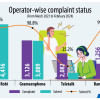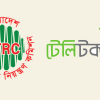Teletalk was born 19 years ago. It turned a profit only for two years

When Teletalk began its journey in December 2004, the mission was to acquire a significant market share of the booming mobile telecommunication sector of Bangladesh by providing countrywide network coverage.
The state-run operator made the debut amid much fanfare and generated a huge interest among the public in the early days by providing cost-effective packages.
There was a time when market leader Grameenphone charged Tk 6 per minute for voice calls whereas Teletalk set the rate at Tk 4.
The affordability extended to the price of Teletalk SIMs, which were notably lower than peers, leading to scenes of long queues at selling points as people sought to take advantage of the cost-effective service.
The government has injected funds to help it expand its footprint. Besides, the operator was given the opportunity to become the first operator to roll out 3G in Bangladesh and pilot 5G.
But the support did not make any difference. And over the years, it has not only failed to live up to its expectations but also become a burden for the government owing to mounting losses.
As it keeps losing customers and its performance in various service metrics deteriorates, Teletalk's revival appears uncertain.
In the last financial year ending on June 30, Teletalk's total loss amounted to Tk 1,337 crore, reflecting a persistent trend of net losses since its establishment. It only made a profit in 2010-11 and 2012-13, according to the financial report for 2022-23.
The company's condition, marked by a significant decline in subscriber numbers, revenue, and service quality during its journey, worsened to such an extent that the auditor cast doubt on Teletalk's ability to continue operations.
According to the audited financial report, the state-run operator suffered a loss of Tk 196.97 crore in FY23, down 19 percent from the previous year and up 12 percent from 2020-21.
The loss amounted to Tk 967.5 crore in the last five years. In contrast, in 2022, Grameenphone reported a net profit of Tk 3,010 crore in 2022 and second-placed Robi's profit stood at Tk 183 crore.
Banglalink, a non-listed company, did not publish its data on profits for the year. Its revenue rose 12.1 percent year-on-year.
Why Teletalk in the red
Higher expenses against the lower income have been the main reason behind the continuous loss of Teletalk although it received huge support and benefits as a state-owned enterprise.
According to the annual report for FY23, revenue totalled Tk 502.01 crore whereas expenditure was Tk 698.98 crore.
Teletalk's woes are nothing new.
"Teletalk has weaknesses in its internal control system," said the Comptroller and Auditor General of Bangladesh in a report after carrying out an audit into the operator for 2004-05 to 2010-11.
The operator's internal control system is not effective due to the administrative weakness of top-level management, it said.
"Teletalk is under serious financial risk, which is detrimental to the company's profitability and sustainability."
Teletalk owes Tk 1,848.63 crore to the Bangladesh Telecommunication Regulatory Commission (BTRC), including dues for licencing fees, unpaid revenues, spectrum fees, and payments to the social obligation fund.
The loan from the government stood at Tk 2,542 crore as of FY23, an increase of 9 percent from Tk 2,331 crore the previous year, showed the annual report of Teletalk.
While other operators have gained customers, Teletalk has lost subscribers in recent times.
In fact, Teletalk was the only operator in 2023 to have lost customers: its customer base was narrowed by 2.3 lakh year-on-year to 64.6 lakh last year, representing 3.39 percent of the total subscriber base in Bangladesh.
On the contrary, the country's subscriber base expanded by 1.05 crore, on the back of the solid performance of three other operators.
Teletalk often ranks the lowest among the operators in Bangladesh when it comes to delivering quality services.
According to the result of the last nationwide drive-test of the BTRC carried out in 2021, the average call success rate of Teletalk was 96.8 percent and the call drop was 2.59 percent.
However, the call success rate should be 97 percent or more and the call drop should be less than 2 percent, according to the policy of the BTRC.
On January 13, Zunaid Ahmed Palak, state minister for telecom, asked the state-run telecom companies to attain profitability by June this year. Otherwise, officials of the companies would have to leave the companies.
AKM Habibur Rahman, managing director of Teletalk, said that they are working to reach break-even by June this year.
Teletalk is currently implementing a Tk 2,200 crore project for 4G network expansion. "Once the project is implemented, Teletalk's network quality will improve to a large extent," he said.
Musfiq Mannan Choudhury, commissioner of the BTRC for finance, accounts and revenue, recently said that the commission would initiate an information system audit into Teletalk this month to determine loopholes.
Abu Saeed Khan, a senior policy fellow at LIRNEasia, a think-tank based in Colombo, suggested stringent measures against Teletalk for its failure to comply with regulations.

 For all latest news, follow The Daily Star's Google News channel.
For all latest news, follow The Daily Star's Google News channel. 








Comments